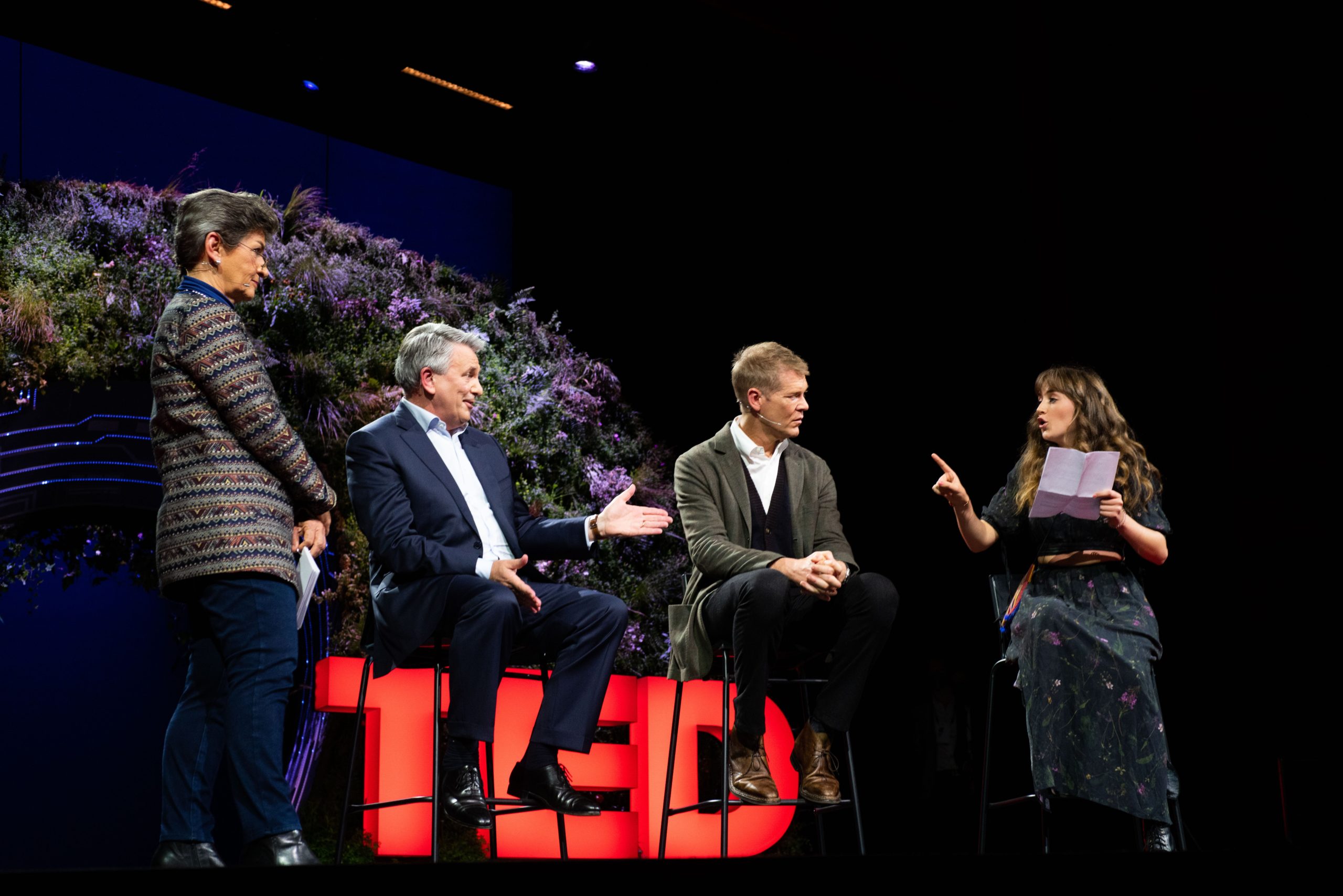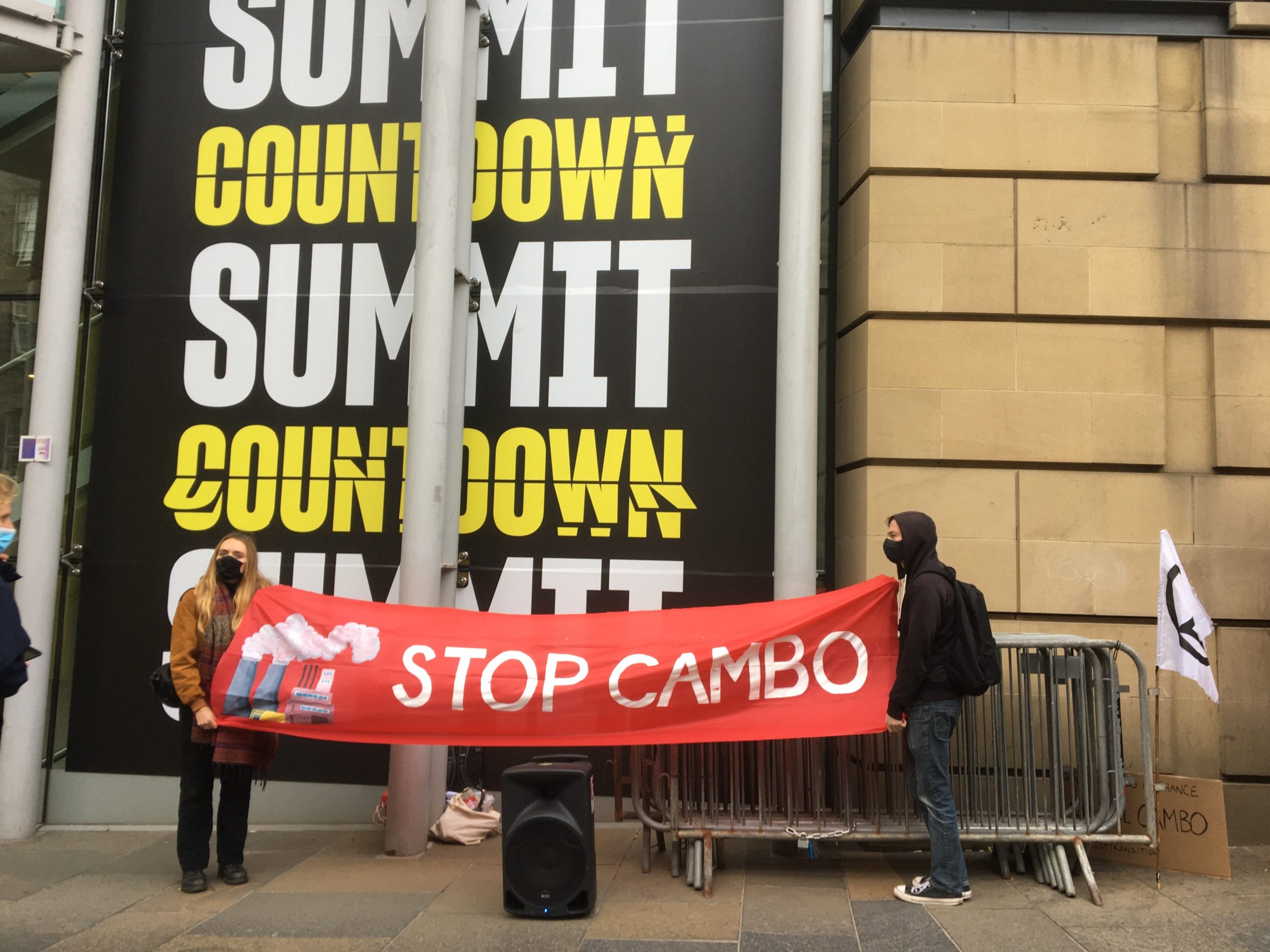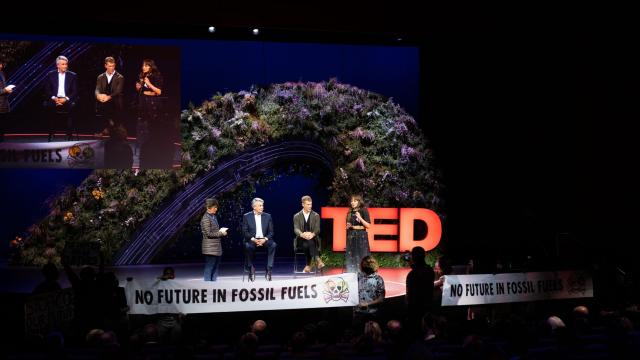On Thursday, a strange scene unfolded at the International Conference Centre in Edinburgh. Shell CEO Ben van Beurden took the stage with a prominent climate scientist and Christiana Figueres, the woman who negotiated the Paris Agreement, at a TED Countdown conference. Van Beurden was there to ostensibly talk up the climate bona fides of one of the largest oil companies in the world that has promised to get to net zero while simultaneously fighting against a Dutch court ruling requiring it to lay out concrete plans to reduce emissions. Instead, he was roasted by youth activists for Shell’s complicity in worsening the climate crisis and egregious human rights abuses.
TED Countdown bills itself as “a global initiative to champion and accelerate solutions to the climate crisis, turning ideas into action.” The Edinburgh event was announced as a forum for speakers to give “inspiring talks” and “share a blueprint for a beautiful net-zero future.” Why, exactly, the CEO of a major oil company that has done more than almost any corporation to bring the planet to a dangerous precipice was invited to be part of that beautiful future is a mystery.
Sources in the room said van Beurden was allowed to speak uninterrupted for nearly 20 minutes. Attendees were not allowed to bring bags into the session, something that hasn’t been enforced at any of the other meeting sessions, they said.
The Shell CEO shared the stage with Scottish climate activist Lauren McDonald, Figueres, and Swedish climate scientist Johan Rockström. During van Beurden’s talk, he blamed consumers for using so much oil, a note he’s sounded before, and said his daughter asked him if he was destroying the planet. His response, according to a Twitter DM from social entrepreneur and B Corp movement supporter in France Elizabeth Soubelet, who was in the room, was, “Do you trust me to do the right thing for you?”
Soubelet described the vibe during his speech as one with “a lot of respect from the audience who seemed to believe that dialogue is important if we’re going to solve our problems.”
McDonald was finally invited to ask van Beurden a question, and things changed quickly. She said she’d like to “offer a little bit of context” for the CEO’s remarks. According to a source with knowledge of the matter, TED organisers helped McDonald write a question and “toned down her speech, but the “one she gave was not the one TED organisers were expecting her to give.” Looking van Beurden straight in the face, she explained that Shell is pushing a plan to build a new oil field in Cambo, off the coast of her home country.
“You should be absolutely ashamed of yourself,” she said.
McDonald went on to say that Van Beurden is “responsible for so much death and suffering” and called him “one of the most evil people in the world,” as she broke into tears. She chronicled Shell’s long history of knowingly polluting the planet and ushering in the climate crisis. She also called the company out for its reported complicity in the horrific killing of Nigerian activists in the 1990s.
“If you’re going to sit here and act like you care about climate action, why are you appealing the recent court ruling that Shell must decrease its emissions by 45% by 2030?” she asked, referring to a landmark May ruling from a Dutch court. “Will you repeal this?”

As Van Beurden began to respond, McDonald cut him off as youth activists climbed onto the stage, unfurling banners that read, “No future in fossil fuels.” The activists walked out of the room as McDonald removed her mic and stepped off the stage to join them. As they walked out the auditorium doors, they shouted, “Don’t just watch us, join us!”
TED did not respond to our request for comment. Shell did not immediately respond to a request for comment.
The CEO referred to the protest as a form of “blackwashing,” a term that co-opts common claims of “greenwashing.” Aja Barber, a writer and fashion consultant in attendance, said in a Twitter DM that “it felt exact[ly] like he was co-opting language from the climate justice movement and doing it poorly at that,” and that the term “feels vaguely racist.” It’s at the very least problematic given that the climate justice movement has centered around people of colour. Shell is no stranger to greenwashing either, with a Netherlands consumer watchdog recently ruling the company’s “carbon neutral” fuel campaign was just PR spin.
The action at the TED conference was organised by Stop Cambo, a campaign focused on halting the oil field off Scotland’s coast, which Shell proposed alongside Siccar Point Energy and on which UK Prime Minister Boris Johnson is preparing to sign off. If approved, the oil field will have the capacity to extract up to 170 million barrels of oil, emitting as much carbon pollution as 18 coal-fired power plants. It would stay in operation until 2050, which is five years after Scotland’s target to reach net-zero greenhouse gas emissions.
Lucy Walczuk, an activist with Stop Cambo who participated in the action, said the group had to quickly organise the action.
“We’ve only realised that he was invited a few days ago, when a couple organisers in Stop Cambo who were invited pointed it out, and realised no activists from Scotland were invited,” they said in a text message. “And we created a group of young people who found this outrageous.”
When Stop Cambo organisers began expressing their displeasure that van Beurden was invited, TED officials provided them with event passes for activists and organisers but didn’t agree to uninvite the CEO. So the campaign launched an action, with Walczuk and others holding banners and chanting in the auditorium and dozens of others doing the same outside the conference centre’s doors.
“We decided to make sure he didn’t get the opportunity to greenwash his company,” said Walczuk. “Shell claims to support a just transition but is still pushing for new oil projects, it’s clear hypocrisy and we won’t allow it.”

At the conference, Shell’s CEO claimed the company is “doing a lot” to go green and has a “strategy of getting to net-zero by 2050.” But as Earther reported last year, that plan is full of gaping holes. That should come as no surprise.
As one of the world’s largest energy producers, Shell has been spewing out greenhouse gas emissions for more than 100 years. Among all investor-owned oil corporations, it’s produced the second-largest share of carbon since the 1800s. The company has known for decades that its dirty products push the climate in an unsafe direction, but it has continued producing and selling them unabated.
TED had planned to release video from the event to come out at the start of COP26, the world’s biggest climate conference. That meeting is what’s considered the world’s last best shot to address climate change. The best way to do that? Ending fossil fuel use, which is the main driver of the climate crisis.
But governments have been reluctant to set targets about fossil fuel production and consumption, instead committing to nebulous emissions cuts. Agreements to deal with climate change have so far been largely toothless, and fossil fuel companies have had a major influence on the negotiations, which take place at a different location every year. The talks held in Madrid in 2019 were sponsored by Spain’s biggest carbon polluter while talks in Poland featured a literal room full of coal.
Shell itself has boasted of playing a major role in shaping the Paris Agreement that Figueres negotiated. The Intercept reported in 2018 that the company’s chief climate advisor said, “We can take some credit for the fact that Article 6 is even there at all. … We put together another straw proposal for the rulebook, and we saw some of that appear in the text.” That portion of the agreement allows for a market-based solution for companies to trade carbon credits and is widely seen as a lifeline to polluting industries like Big Oil. Shell and other oil companies have worked in bad faith for decades to stop climate regulations at the international, national, and even local levels in their tracks.
The UK, which is hosting this year’s climate conference, has constrained the role oil companies and major polluters can play in sponsoring and being part of the event; but it’s also given a climate champion award to a tar sands executive and reportedly met with oil and gas executives. The country, via COP26, is listed as a strategic partner for TED Countdown. Why TED would invite the CEO of Shell to its stage for a conference meant to set the tone of climate talks is unclear. Earther has reached out and we will update this post if we hear back from the organisers.
“There is no liveable future with fossil fuels companies,” said Walczuk. “On a conference about the future of our climate, it is unacceptable to include fossil fuel CEOs.”
